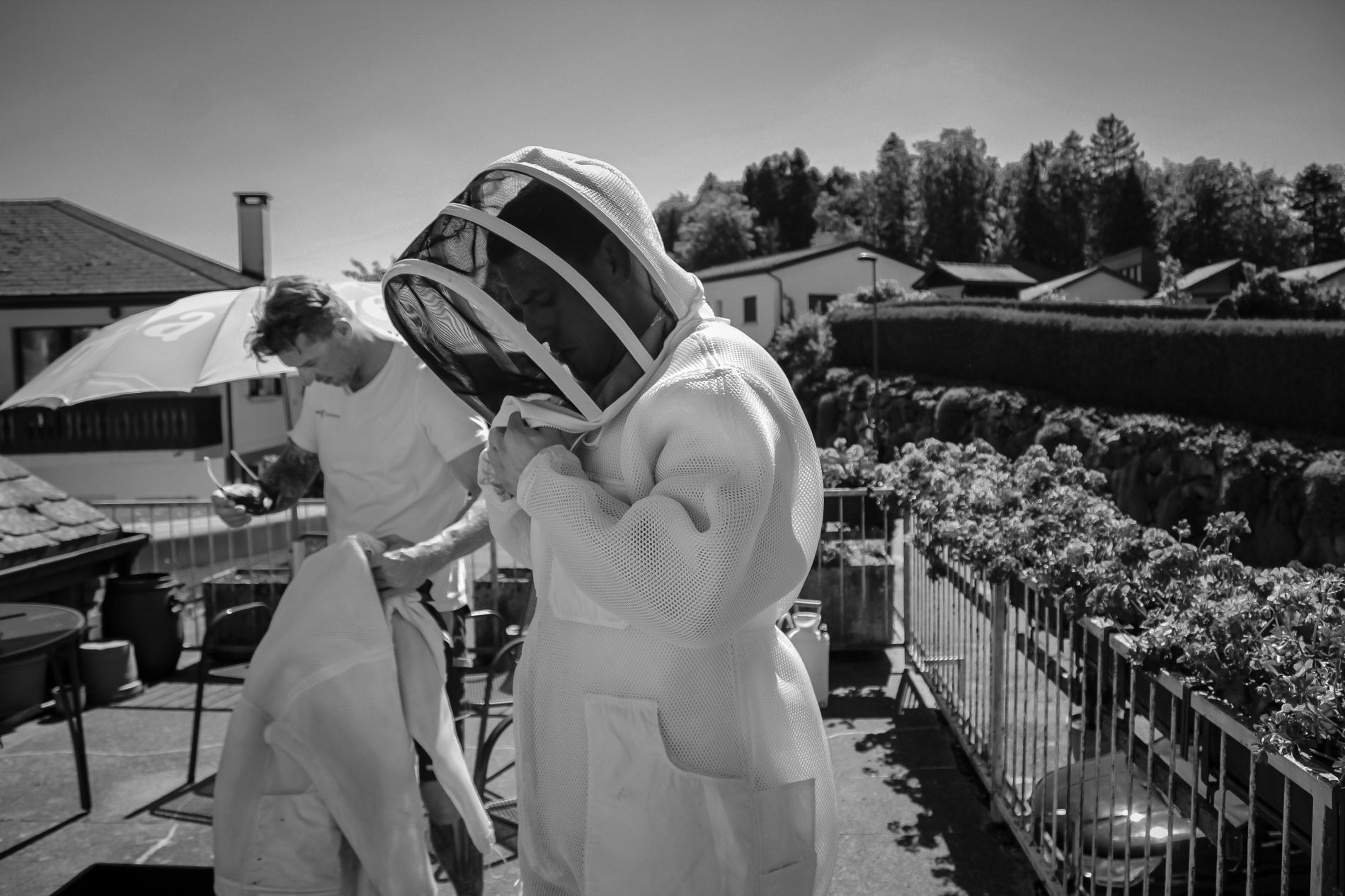
Fighting Asian hornets in Brusino Arsizio
Have you discovered an Asian hornet's nest? We'll be on site quickly! Call now - Daily Mon-Sun 07:00-21:30. Contact us now: 058 510 22 54
Having the Asian hornet's nest removed
The hornet species Vespa velutina, which hails from South-East Asia, has intrusively spread to Switzerland and the entire subcontinent. While it is not hostile towards humans, it has become notorious as a hunter of honey bees, creating apprehension among beekeepers. Just a small number of these hornets have the capability to attack and eliminate a colony of bees in a swift manner. If you have discovered a hornet's nest on your house, patio, shed, or in your blind box, contact our experts for hornet nest removal in Brusino Arsizio!
Use the uncomplicated telephone service of the Hornet experts in Brusino Arsizio and simply inform us at 058 510 22 54, we will be on site quickly so that you and everyone in your area feel completely safe again.
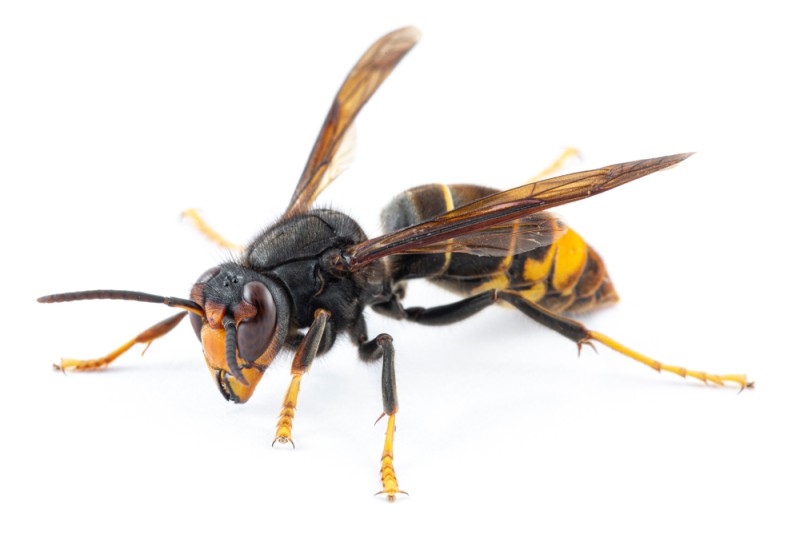

Appearance of the Asian hornet
Here are some characteristics that distinguish the Asian hornet:
1. Size: The queen can reach a length of about 3 cm, while the workers are slightly smaller and measure about 2.5 cm.
2. Color: The Asian hornet has a dark body that is almost black, with a yellow stripe at the back of the abdomen. Its face is orange-yellow.
3. Wings: The wings are dark and almost smoky gray.
4. Legs: The hornet has yellow tips on its legs, which is a striking distinguishing feature when it flies.
5. Nest: The Asian hornet's nest is often high in the trees, but it can also be found underground or in tall structures such as chimneys. It has an oval shape and is made of chewed wood, which gives the hornet a papery texture.
It is important to distinguish the Asian hornet from the European hornet (Vespa crabro), which is more harmless and a natural part of the European fauna. If you suspect you have found an Asian hornet nest near you in Brusino Arsizio, you should report this to the local authorities, or using our reporting form, as they can spread quickly and be harmful to bees and other insects. To avoid being attacked by the flying inhabitants, you should hire a professional pest controller such as the Hornet Experts Brusino Arsizio. We can identify the nest beyond doubt and take further steps to remove the Asian hornets professionally.
News about the Asian hornet in Brusino Arsizio
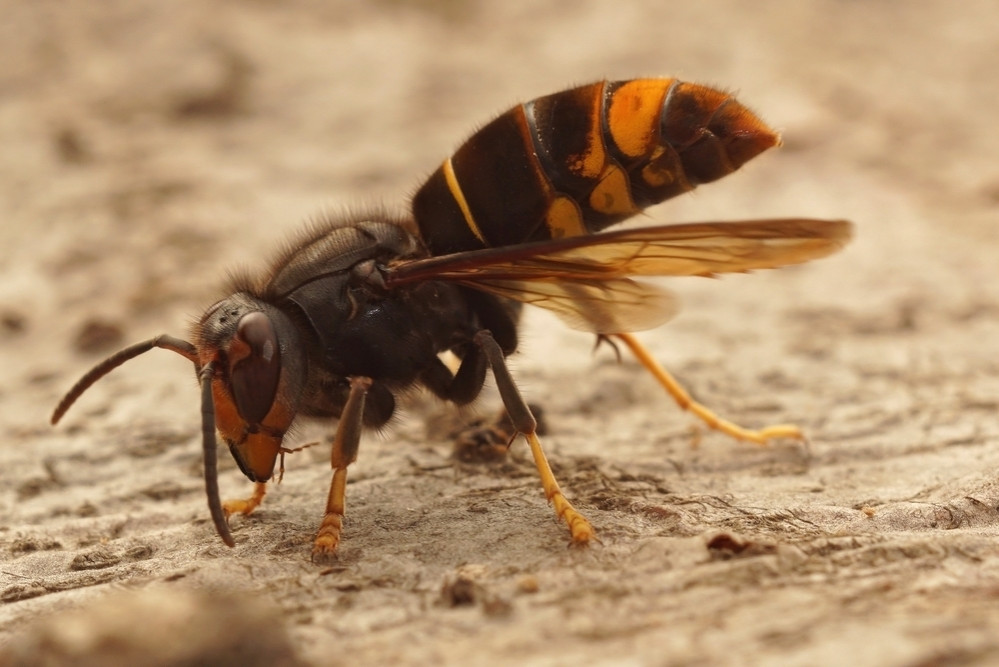
02.12.2025 Western Switzerland: Killer hornet eats bees
The territory of the Asian killer hornet has expanded considerably this year, with a notable increase reported in western Switzerland. This invasive species poses a significant threat to native bee populations, as bees make up the majority of its diet. The potential consequences are serious. Moreover, the hornet represents a danger to individuals with allergies to its venom.
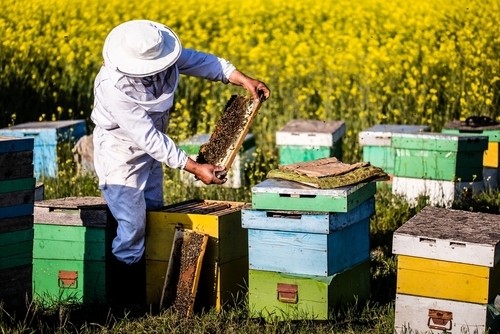
25.11.2025 Serious concerns about the bee population!
Asian hornets are inflicting significant harm on beehives across multiple parts of Europe, as reported by local beekeepers. Even a small number of hornets can destroy an entire bee colony within hours. This sharp decline in pollinators could have serious consequences for pollination, local ecosystems, and agricultural productivity.
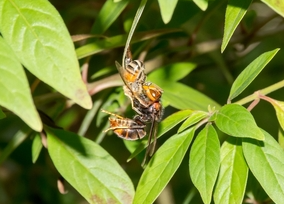
18.11.2025 Asian hornet doesn't just eat bees!
The danger it presents to insects is substantial!
The Asian hornet feeds largely on honeybees—up to 85 percent of its diet—alongside beetles and flies. This high level of predation not only poses difficulties for fruit growers but also further threatens already vulnerable bee populations.
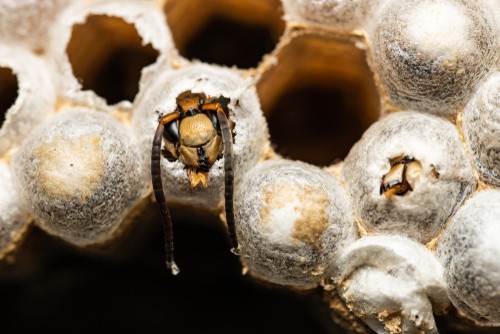
11.11.2025 How did the Asian hornet get to Europe?
The Asian hornet likely arrived in Europe unintentionally and has quickly expanded throughout France and nearby countries. Its adaptability to different environments and the absence of natural predators have contributed to its rapid spread. A single nest can generate several hundred new queens in one breeding season.
Asian Hornet Reporting Form
Please fill out all required fields and submit the form.
Help us!
If you discover an Asian hornet or a nest of this invasive species in Brusino Arsizio, it is of the utmost importance that you report it immediately. The Asian hornet is not only dangerous to humans, but also poses a serious threat to native bee populations and the ecological balance in Switzerland.
Why is it important to report the find?
When the Asian hornet becomes established in a region, its impact on native insects, particularly honey bees, becomes evident. By preying on bees, this hornet species plays a critical role in the decline of pollinator populations, ultimately affecting the local flora and agricultural productivity. By reporting sightings, experts can react quickly, remove the hornets or their nests and thus prevent the spread of this invasive species.
Notification form for sightings
Help us protect our native insect populations from the overpopulation of the Asian hornet in Switzerland! By reporting any suspicions or sightings using our special reporting form, you are providing valuable information that enables us to intervene early and effectively minimize the potential spread of this dangerous species in our delicate ecosystems.
Your contribution is crucial in the fight against the Asian hornet in Brusino Arsizio. Together we can protect nature and maintain the balance of our ecosystems;
Thank you for your vigilant attention and your commitment to protecting our environment.
How dangerous is the Asian hornet?
The Asian hornet (Vespa velutina) is a predatory insect that originated in Asia and has spread in recent years to various parts of Europe, including France and now also Switzerland and in Brusino Arsizio. Although it poses a threat to honey bees and native biodiversity, it is generally no more dangerous to humans than other wasp species. Nevertheless, there are some aspects to be aware of:
1. Threat to honey bees: The Asian hornet preys on honey bees, threatening native bee populations. A decline in bees can have a negative impact on pollination and thus on local flora and agricultural production.
2. Stings: As with other wasp and hornet species, the stings of the Asian hornet can also be painful. For most people, the stings are unpleasant but not dangerous. However, people who are allergic to wasp or hornet stings can suffer a severe allergic reaction, which in the worst case can lead to anaphylactic shock.
3. Aggressiveness: Although the Asian hornet is not necessarily more aggressive towards humans than other wasp species, it can become aggressive if it feels threatened, especially near its nest.
4. Ecological effects: Apart from the direct effects on honey bees, the spread of the Asian hornet can also disturb the ecological balance by affecting the populations of other insects.
Recognizing the dissimilarity between the Asian hornet and the Asian giant hornet (*Vespa mandarinia*) is crucial to avoid confusion. The giant hornet, referred to as the "killer hornet," is notably larger and carries a more potent venom, which increases the potential risk to humans compared to the Asian hornet.
If you have discovered a nest, call us immediately: 058 510 22 54
Our hornet professionals in Brusino Arsizio are certified by the VSS.
Frequently Asked Questions About Asian Hornets in Brusino Arsizio
The Asian hornet is notorious for its capacity to deliver stings that can cause severe harm, placing it at a significantly higher level of danger than most other hornet species.
Displaying a remarkable size of up to 3 cm, the Asian hornet is an imposing stinging insect. Its slender, black frame is distinctly patterned with an elaborate coat of orange, yellow, and black stripes.
Typically known for its reserved and tranquil demeanor, the Asian hornet can undergo a remarkable change in behavior when provoked or trapped. In these situations, it becomes highly active and fiercely defensive, exhibiting an aggressive response to perceived threats.
Humans must exercise caution around the Asian hornet, as it possesses potent venom that is highly toxic and can cause excruciating pain. Additionally, its bites have the potential to trigger allergic reactions.
The Asian hornet's venomous sting poses a significant danger, setting it apart from other wasps. Its sting is more painful and has the potential to induce allergic reactions.
Should you encounter an Asian hornet, it is vital to report the sighting to a local wild bee protection officer or the designated department within the Ministry of Agriculture by following the appropriate steps.
Promoting the reporting of Asian hornets is essential to prevent attacks and control their further dispersal. This particular insect species exhibits territorial and aggressive tendencies, necessitating swift action.
To address the presence of Asian hornets in Switzerland, it is necessary to enlist the services of professional hornet control. In this regard, reaching out to a trustworthy pest control service is advisable.
No protective measures have been established for the Asian hornet; hence, it is crucial to diligently monitor their populations and prevent their unchecked dissemination.
In its hibernation state, the Asian hornet can be observed either clustering within colonies or seeking solitude in the corners of walls, buildings, garden sheds, temporary structures, or tree hollows.
Would you like more information about Asian hornets? Then take a look at our FAQ's about Asian hornets.
Private inquiry form
For an uncomplicated request to remove an Asian hornet's nest, please use our contact form for private individuals.
Real estate inquiry form
Use our property management order form to request the removal of an Asian hornet's nest.
Ecotox GmbH
Partner of: frelon-asiatique-suisse.ch & asiatische-hornisse.ch




_7.jpeg)
_7.jpeg)
_10.jpeg)
_8.jpeg)